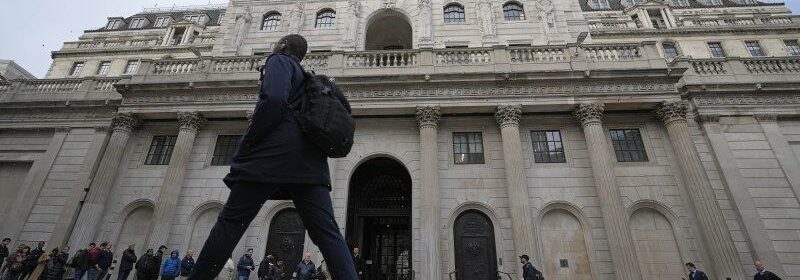‘Dysfunction in this market’: Bank of England intervenes over ‘material risk’ to UK economy

London: The Bank of England has taken a dramatic step to calm a crisis in government bond markets, suspending its program to sell bonds and instead committing to buy them to counter “dysfunctional markets”.
The central bank has been forced to make the emergency intervention as it warned of “material risk” to UK stability amid turmoil that has sent government borrowing costs soaring.
The Bank of England has been forced to make an emergency intervention.Credit:AP
The value of the pound has collapsed to record lows against the US dollar and British bonds have plunged since Friday, when UK Chancellor Kwasi Kwarteng unveiled his “mini” Budget involving £45 billion ($75 billion) of debt-financed tax cuts.
The cost of government borrowing has surged and households are now braced for big increases in mortgage payments.
In a statement on Wednesday morning London time, the bank said it would carry out temporary purchases of long-dated UK government bonds immediately.
“Were dysfunction in this market to continue or worsen, there would be a material risk to UK financial stability,” it said.
“The purchases will be carried out on whatever scale is necessary to effect this outcome,” it added, saying the Treasury would underwrite any losses.
UK Chancellor Kwasi Kwarteng says tax cuts for the wealthy and support for energy prices are the only way to reignite economic growth.Credit:AP
The central bank said it had pushed back by a month the start of its plan to reduce its balance sheet by selling gilts in its portfolio, which was due to begin next week.
Thirty-year gilt yields, which earlier on Wednesday touched a 20-year high of more than 5 per cent, fell to 4.63 per cent. The yield on 10-year gilts fell to 4.26 per cent from 4.59 per cent.
The International Monetary Fund and ratings agency Moody’s ramped up pressure on Britain to reverse a new economic strategy that was roiling financial markets for a fourth day on Wednesday and has sparked alarm about the UK housing market.
The rare intervention in a G7 country from the IMF, the global lender of last resort, underscored the severity of the situation facing the country.
“Given elevated inflation pressures in many countries, including the UK, we do not recommend large and untargeted fiscal packages at this juncture,” the IMF said. “It is important that fiscal policy does not work at cross purposes to monetary policy.”
With the cost of borrowing soaring, mortgage lenders pulled hundreds of products, while several media outlets have published anecdotal reports that people were struggling to get through to lenders to either complete or change mortgage deals.
More than 1,200 mortgage deals have disappeared in two days this week, in an unprecedented mortgage market rout. A record 935 rates were taken off the market yesterday, according to data provider Moneyfacts, beating the record of 462 that was set at the start of the pandemic.
Kwarteng, who has been in the job for less than three weeks, has responded to the criticism by insisting that tax cuts for the wealthy and support for energy prices are the only way to reignite economic growth.
He has insisted he is “confident” his strategy will deliver the promised economic growth, but will meet bankers Wednesday in an effort to calm nerves after his mini-budget.
The Treasury blamed “significant volatility” in global financial markets rather than the chancellor’s unfunded tax cuts last week. “The chancellor is committed to the Bank of England’s independence. The Government will continue to work closely with the bank in support of its financial stability and inflation objectives,” the Treasury said.
Get a note directly from our foreign correspondents on what’s making headlines around the world. Sign up for the weekly What in the World newsletter here.
Most Viewed in World
From our partners
Source: Read Full Article

